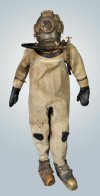BiggBlue
Robin
- Time of past OR future Camino
- 17 Frances 18 Portuguese,
19 Primitivo 22 Norte
I am convinced that if I ever manage to invent air-conditioned underwear or truly waterproof gear for the Camino that keeps you dry, I will become a millionaire. Today, I walked in heavy rain from about 7 in the morning until about 11. I wore a shower-proof jacket and topped it with my poncho. Within an hour, everything was wet.
If there is a secret to staying warm, I think it involves wearing merino wool next to your skin because it retains heat even when wet. Unfortunately, I didn't have merino wool on today, so I lost heat and felt very chilled by 11 o'clock, in the temperature sense, not the lifestyle sense.
Having done many Caminos, I am still unsure about the best formula for staying dry and warm. Any suggestions are most welcome.
If there is a secret to staying warm, I think it involves wearing merino wool next to your skin because it retains heat even when wet. Unfortunately, I didn't have merino wool on today, so I lost heat and felt very chilled by 11 o'clock, in the temperature sense, not the lifestyle sense.
Having done many Caminos, I am still unsure about the best formula for staying dry and warm. Any suggestions are most welcome.




















